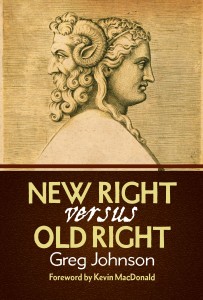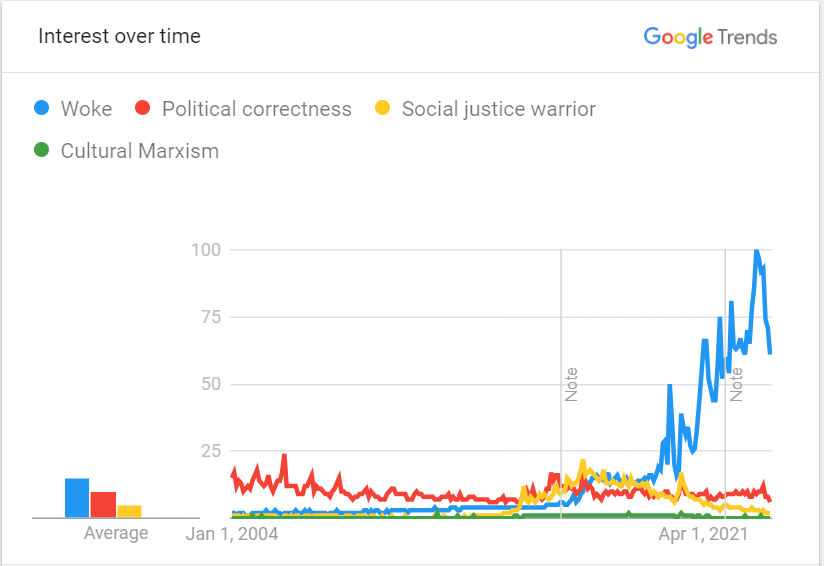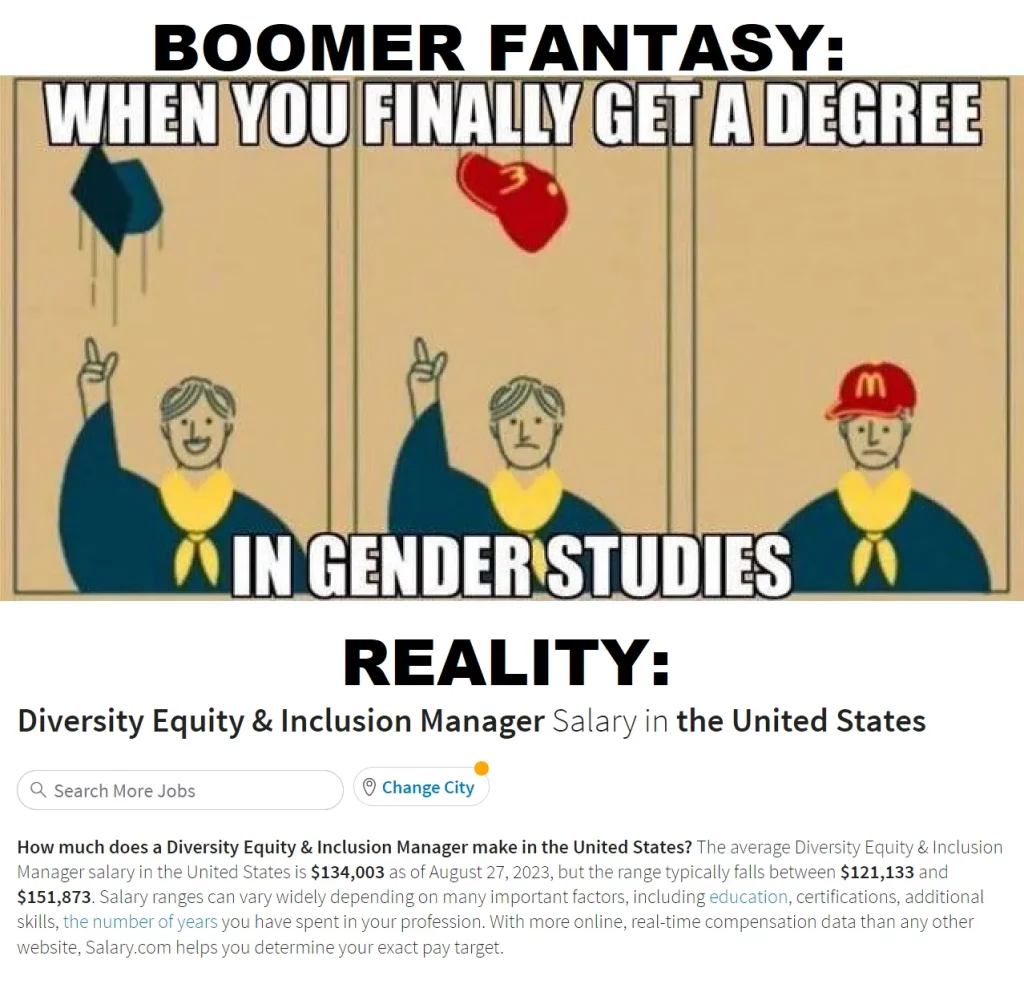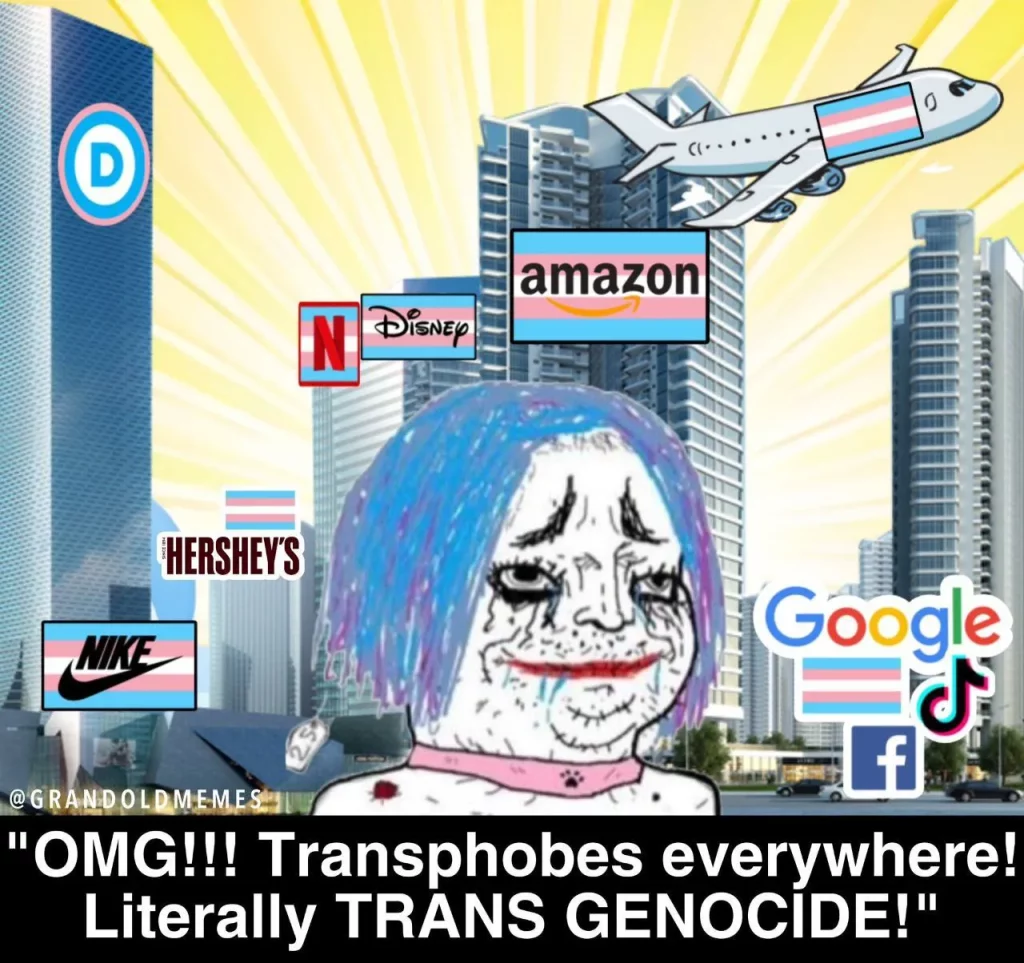The Metapolitics of “Woke”
Posted By Endeavour On In North American New Right | Comments Disabled2,662 words
The word “woke” was first used as an adjective, as opposed to “awake,” in a political context by black Americans during the twentieth century to describe someone who is “alert to racial prejudice and discrimination.” Starting in 2014, the progressive political trends which had been on the rise since the 1960s were cranked up to 11 within Western media, universities, corporations, and governments. This period has come to be known as “The Great Awokening,” during which individuals on the Left would refer to themselves as “woke” as a show of support for progressive causes such as Left-wing racial politics, the LGBT movement, or feminism.
After several years of rising progressive radicalism in the West, the word “woke” was co-opted by the Right and the center as a pejorative to describe aggressive Left-wing politics in the late 2010s. The word has now lost its original meaning and has fallen out of use on the Left. Today, it is almost exclusively used disparagingly by the Right and the center to denote someone they consider too far to the Left. Over the past five years, the word “woke” has become a mainstay in political discourse in the Anglosphere, and the nouns “wokeness” and “wokeism” have been coined off of this root word. Other languages have adopted the word “woke” and its offshoots into their own political cultures, such as French, German, Russian, and even Japanese.
“Woke” is not the first term ever used to describe the phenomenon of aggressive Left-wing politics. In the early and mid-twentieth century, the label “Bolshevism” or “Communism” was often applied to the far Left, whether those accused of it embraced the ideology or not. In the late twentieth and early twenty-first century, following the fall of Communism, the phrase “political correctness” came into common use to describe overbearing progressive politics. In the mid to late 2010s, the pejorative phrase “social justice warrior” and the acronym “SJW” were used to describe those on the Left who back then would’ve referred to themselves as “woke,” before the connotations of that word became overwhelmingly negative. The phrase “cultural Marxism” has also been used at times over the past two decades, though its usage was less widespread.
Judging from Google Trends [2], in the Internet era the phrase “political correctness” was primarily used to denote this phenomenon from at least 2004 up until 2014, when what is now referred to as “The Great Awokening” kicked off. From 2014 to 2018, the phrase “social justice warrior” overtook “political correctness.” Since 2018, the pejorative “woke” has been the most commonly-searched word for this purpose, but what’s more noteworthy is that the popularity of the word “woke” has dwarfed that of all of its precursors.
The Homeland Institute recently did a study [4] which found that the accusation of being “woke” has a significant negative impact on the popularity of a political candidate or business among white Americans. In addition, the accusation of woke is becoming nearly as detrimental for politicians and businesses as being hit with the Left’s favorite pejorative: “racism.” Their findings were as follows:
- 61.9% of respondents said they are less likely to support a business if it is accused of being racist.
- But only 41.8% said they would be willing to follow through with boycotting a business that is accused of being racist if they had to pay 10% more or drive an extra mile.
- 43.7% said they are less likely to support a business if it is accused of being woke.
- But only 29.1% said they would be willing to follow through with boycotting a business that is accused of being woke if they had to pay 10% more or drive an extra mile.
- 65.7% said they would be less likely to vote for a politician if that politician was accused of being racist.
- 45.6% said they would be less likely to vote for a politician if that politician was accused of being woke.
- For Independent respondents, 65.5% said they would be less likely to vote for a politician accused of being racist compared to 41.3% of Independent respondents who said they would be less likely to vote for a politician accused of being woke.
- Surprisingly, though, among Republican respondents 42.6% said they were less likely to vote for a politician accused of being racist, compared to 79% who said they were less likely to vote for a politician accused of being woke.
- Additionally, 7.2% of Republican respondents said they were more likely to vote for a politician who is accused of being racist.
The Homeland Institute also notes:
First, the poll asked about “racism” without making any distinction about the race of the person(s) it was directed against. Adherents of Critical Race Theory claim that racism is “power plus prejudice” and thus only whites can be racist, and never the victims of racism. Most ordinary Americans, especially those who are not far-Left, take the common-sense view that racism is racial discrimination against any race. Many Americans also doubt the assertion that whites are somehow privileged given the BLM riots, affirmative action, and doxing.
Furthermore, a May 2022 University of Maryland Critical Issues Poll found that across Americans of all races, 50% of Republicans and 20% of Independents thought there has been “a lot more” racism against whites compared to five years ago. 21% of Republicans and 16% of Independents said “a little more.” 21% of Republicans and 32% of Independents said “about the same.” This shows that many Republicans and Independents think that it is not just theoretically possible to be racist against whites, but that anti-white racism does in fact happen in real life and is even increasing. Therefore, anti-racist sentiment should be understood as oftentimes also encompassing racism against whites.
Similarly, YouGov has also done a study [5] on both knowledge of and attitudes towards wokeness. Some highlights of their findings are as follows:
Asked about the term ‘woke’, most Britons (57%) now say “I have heard this being used and know what it means”. This is up from 41% in early 2021.
Among people who use the term, the vast majority do so in a pejorative sense — 73% use it in a disapproving way, compared to only 11% who employ it approvingly.
Currently, only 16% of Britons say they consider themselves woke, up marginally from 12% in 2021. However, the number who consider themselves not to be woke has grown three times as much, rising 12 points from 23% to 35%.
One in seven Britons (14%) say being woke is a good thing, within the margin of error from the 2021 study (11%). By contrast 23% of Britons consider wokeness a bad thing (up eight points) and 18% say it is neither good nor bad (up four points).*
*Note: The remainder report not knowing what “woke” means. Of Britons surveyed [6] who report knowing what “woke” means, 24% say it’s a good thing, 41% say it’s a bad thing, 31% say it’s neither good nor bad, and 4% don’t know.
In short, the word “woke” has become a pejorative used to describe progressive politics, the usage of which is becoming increasingly widespread, already more so than any of its precursors (at least in the era of the Internet). To understand the metapolitical significance of this, we can look at the effect which its Left-wing counterpart, “racism,” has had. The predecessor of the word “racism” was “racialism,” which was coined in the early twentieth century to mean the belief that humanity was divided into various races with differing attributes. In a political sense, “racialism” meant to advocate policies based on this belief.
The word “racialism” had neutral connotations before the 1930s, when it was replaced by the now commonly-used term “racism.” This was used to describe the racial policies of National Socialist Germany and gained very negative connotations following the Second World War. The effect that this one six-letter word has had over the past 80 years is that it has pathologized any and all ethnocentrism among people of European descent to such an extent that it is considered the gravest manifestation of evil by the modern Western intelligentsia.
Discourse regarding any issue related to race in the West, be it immigration, culture, crime, or disparities in academic or financial success, is paralyzed by the specter of the accusation of racism. Addressing these issues openly and honestly is impossible in polite society, as everyone in any position of influence knows damn well that doing so will cost them their career (or worse). This one little word has made advocacy of white interests through mainstream political, cultural, or academic avenues unworkable. The Left’s other buzzwords such as “sexism,” “homophobia,” or “anti-Semitism” have had a similar effect on the respective issues they are deployed for.
 [7]
[7]You can buy Greg Johnson’s New Right vs. Old Right here [8]
As noted before by the Homeland Institute, a significant portion of the public considers anti-white discrimination or sentiment to be a form of racism and don’t buy into the far Left’s “racism means power plus privilege” narrative. However, in an academic, cultural, and legal sense, the “power plus privilege” is the functional meaning of “racism.” Ethnocentrism among non-white groups is not demonized in the same manner, and anti-white discrimination is actively encouraged by the mainstream culture and often given legal sanction. No anti-white race activist who has made a career from lobbing the accusation of racism (at white people) is afraid of being accused of being racist themselves (against white people) and subsequently cancelled.
With this in mind, the positive metapolitical effect of the word “woke” coming into wide usage in political life in the West is that, in the same way “racism” pathologized pro-white sentiment, “woke” pathologizes anti-white sentiment. While the accusation of woke still isn’t quite as potent as the accusation of racism, it is getting there quickly. For example, it’s becoming common for Leftists to feel the need to deny being woke, the same way conservatives have desperately tried to deny being racist for decades. And this is despite every influential institution in the Western world actively promoting the values which are considered woke.
Now, I know what many on the online Right will say to this. Either they will say that “woke” doesn’t accurately describe the true nature of the regime, or they will say that simply being anti-woke is not a strong enough position to oppose the regime’s agenda. On the first objection which I am certain to receive, I say that it doesn’t really matter what term is used as long as it has the right metapolitical effect. Many in our sphere say that the word “woke” is embarrassing. I don’t totally disagree, but it’s very difficult to control the development of language, especially when you don’t control the media or universities. If this is the word which the culture adopts, it’s the one you have to go with. What might seem silly to an active participant in the online Right sphere might be a useful way to understand things for members of the general public who aren’t so engaged.
Many will say that we shouldn’t call it “woke,” but “anti-white.” I see the point that emphasizing this key element is essential, which is why I often use “anti-white” as a preface when describing something as “woke.” For example, I’ll often say “this anti-white woke professor” or “this anti-white woke movie.” This emphasizes the anti-white nature of what the public identify as being woke. Others will have a more intellectual argument against its usage, saying the accurate term would be “cultural Marxism” or “neoliberalism.” I’ve always liked the phrase “bioleninism,” personally. This is a discussion which can be had among dedicated dissident Right thinkers, but when it comes to the broader public discourse, I’d rather not get into a theorycel debate over minute ideological technicalities when a the single one-syllable word, “woke,” can communicate what you are referring to in an instant.
The second objection is more of a cause for concern. There has developed an anti-woke grift industry in which centrist or the center-Right garner large followings by mocking the minor aspects of wokeism — Hollywood movies, college feminists, etc. — while refusing to address or in some cases even defending its core premises. In this respect, anti-woke grifters trivialize what is a very serious threat. The word “woke” still carries some connotations of boomerism, which sees proponents of far-Left ideas as a bunch of crazy college kids who will snap out of it once they get a real job and not as the very real danger which they are.
Herein lies the task at hand for white advocates. The goal needs to be to communicate what this concept known as “woke,” which the public is becoming increasingly aware of and which they hold an increasingly negative opinion of, really means. It does not simply mean being lectured by a bunch of blue-haired 19-year-olds or Hollywood movies being trash. That’s just the tip of the iceberg. What it really means is the West being invaded by the Third World, whites being purged from all positions of power, children being forcibly sterilized, a blind eye being turned to non-white criminality, and being fired from your job or even jailed if you voice any disagreement. Furthermore, wokeism isn’t a creation of unemployed gender studies majors. It is the official ideology of every government, mainstream media outlet, big university, and major corporation in the West.
Having a single word which both encapsulates and demonizes anti-white politics come into common use in the West’s political culture is an invaluable metapolitical victory. The public is becoming increasingly aware of this problem. The goal now needs to be getting through to them just how serious this problem actually is. Whether or not the word “woke” remains in popular use or is replaced by a new variation is inconsequential to me. What needs to happen is that it must be applied to the deeper foundations of anti-white politics rather than just surface-level trivialities. I am hopeful that this will happen, because people tend to follow beliefs to their logical conclusions. We can just look at how the term “racism” evolved on the Left for an example.
As mentioned earlier, the word “racism” was first used with negative connotations following the Second World War to describe National Socialist Germany. A decade or two later, racial segregation and white-only immigration policies became racist, too. After another decade or so, punishing non-white criminals for breaking the law became racist as well. Then, white countries having a border at all became racist. And today, we’ve gotten to the point that anything imaginable which could potentially benefit white people, either intentionally or inadvertently, is called “racist.” Since the concept of anti-racism is fundamentally anti-white, it leads everything to an anti-white conclusion.
I also believe that the concept of woke — or whatever term could replace it in the future — will come to be much more encompassing than it currently is, which would be a powerful metapolitical weapon in the hands of white advocates. Even if the concept of woke only pathologizes the most extreme forms of anti-white politics today, just remember that the concept of racism went all the way from a condemnation of the Third Reich to a condemnation of classical music [11]. It’s not out of the realm of possibility that the negative connotations associated with the word “woke” today could be applied to things such as the Civil Rights Act, gay marriage, or non-European immigration in the future.
So, further metapolitical work must be done to get the concept of woke to the point where the utterance of the word — or any variations of it — functions as a condemnation of the entire anti-white system, not just its excesses. The goal needs to be to build up a disdain for anti-white politics among people of European descent to the point where it overrides the aversion to pro-white politics into which they have been conditioned. In other words, we need to get it to the point where being considered “woke” is more damning that being considered “racist.” To borrow a phrase from the Left, we’ve come a long way, but there’s still a lot of work left to be done.
The above was reprinted with the permission of the author from Endeavour’s Substack [12].
* * *
Like all journals of dissident ideas, Counter-Currents depends on the support of readers like you. Help us compete with the censors of the Left and the violent accelerationists of the Right with a donation today. (The easiest way to help is with an e-check donation. All you need is your checkbook.)
Due to an ongoing cyber attack [13] from those who disagree with our political discourse, our Green Money echeck services are temporarily down. We are working to get it restored as soon as possible. In the meantime, we welcome your orders and gifts via:
- Entropy: click here [14] and select “send paid chat” (please add 15% to cover credit card processing fees)
- Check, Cash, or Money Order to Counter-Currents Publishing, PO Box 22638, San Francisco, CA 94122
- Contact [email protected] [15] for bank transfer information
Thank you for your support!
For other ways to donate, click here [16].



